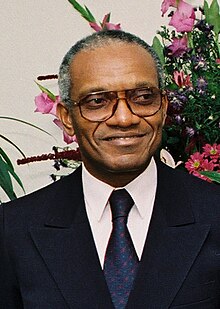- ↑ Clements, John (1994). "Clements' Encyclopedia of World Governments".
- ↑ "São Tomé president congratulates secretary of Gulf of Guinea Commission", AngolaPress, 22 January 2009.
Miguel Trovoada | |
|---|---|
 Trovoada in 1995 | |
| 2nd President of São Tomé and Príncipe | |
| In office 21 August 1995 –3 September 2001 |

